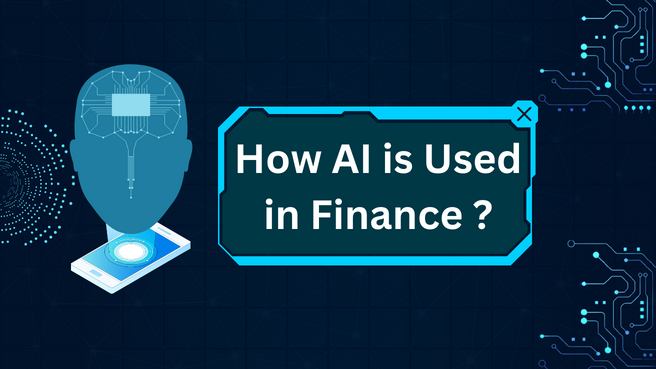How AI is Used in Finance ? A Detailed Guide

The advent of Artificial Intelligence (AI) has revolutionized various sectors, with finance being one of the prime fields experiencing significant transformations. The integration of AI in finance is reshaping the way institutions operate, enhancing efficiency, and providing a more personalized experience to customers. From automating routine tasks to predicting market trends, AI technologies are enabling financial services to be more accessible, faster, and reliable.
Automation of Routine Tasks
One of the most basic yet impactful uses of AI in finance is the automation of routine and repetitive tasks. AI-powered software can process and analyze large volumes of data at speeds unattainable by human employees. This capability is particularly beneficial for tasks like transaction processing, data entry, and compliance checks. Automation not only reduces the time taken to complete these tasks but also minimizes errors, thereby increasing operational efficiency and allowing human employees to focus on more strategic activities.
Fraud Detection and Prevention
Financial fraud poses a significant risk to both institutions and customers. AI has proven to be a formidable tool in detecting and preventing fraudulent activities. Machine learning algorithms can analyze patterns in transaction data to identify anomalies that may indicate fraudulent behavior. These systems learn over time, continuously improving their accuracy in detecting suspicious activities. For instance, if an account suddenly shows transactions in a location where the account holder has never been before, the AI system can flag it for further investigation.
Credit Scoring and Risk Assessment
AI has also revolutionized the way financial institutions assess creditworthiness and manage risk. Traditional credit scoring models rely on a set of fixed criteria, which might not accurately represent an individual’s true credit risk. AI and machine learning models, on the other hand, can analyze vast amounts of data, including non-traditional data points such as social media activity or mobile phone usage patterns, to make more accurate predictions about an individual’s behavior. This approach can lead to more nuanced risk assessments, potentially opening up credit to individuals who would have been denied by traditional models.
Algorithmic Trading
In the investment sector, AI plays a crucial role in algorithmic trading, where trading decisions are made automatically based on predefined criteria. AI algorithms can analyze market data in real-time, predict market movements, and execute trades at optimal times without human intervention. This capability can enhance trading strategies’ efficiency and profitability, although it also raises concerns about market volatility and the ethical implications of removing human judgment from financial decision-making.
Personalized Banking Services
AI is making financial services more personalized and customer-friendly. Chatbots and virtual assistants, powered by natural language processing (NLP) technologies, provide customers with 24/7 access to banking services, answering queries and performing transactions without human intervention. Furthermore, AI can help financial institutions offer personalized financial advice and product recommendations based on an individual’s financial behavior and goals.
Debt Consolidation
In the context of personal finance management, AI can also assist individuals in managing their debts more effectively. Through personalized advice and predictive analytics, AI systems can suggest optimal strategies for debt consolidation, helping individuals to combine multiple debts into a single debt with more favorable terms. This can result in lower interest rates and a more manageable repayment plan, ultimately aiding individuals in achieving financial stability.
Enhancing Customer Experience
AI’s role in enhancing customer experience in the financial sector cannot be overstated. Beyond the convenience of chatbots and virtual assistants, AI algorithms are capable of analyzing customer data to provide tailored financial advice, product recommendations, and even predictive alerts about potential financial issues or opportunities. For example, AI can notify customers of unusual spending patterns that may indicate fraud or suggest ways to save money based on their spending habits. This level of personalized service not only improves customer satisfaction but also fosters loyalty and trust towards the financial institution.
Regulatory Compliance and Risk Management
Financial institutions operate in a highly regulated environment, where compliance with laws and regulations is critical to avoid penalties and maintain reputation. AI can play a pivotal role in regulatory compliance by automating the monitoring and reporting processes. AI systems can sift through vast amounts of transaction data in real-time to ensure adherence to anti-money laundering (AML) laws, know your customer (KYC) regulations, and other legal requirements. Moreover, AI’s predictive capabilities can be leveraged in risk management, allowing financial institutions to identify potential risks before they materialize, thereby mitigating potential losses.
Financial Planning and Advisory
The advent of robo-advisors is a testament to how AI is democratizing access to financial planning and advisory services. These AI-driven platforms provide personalized investment advice at a fraction of the cost of human financial advisors, making them accessible to a broader audience. By analyzing market data, individual financial goals, and risk tolerance, robo-advisors can construct customized investment portfolios and dynamically adjust them in response to market changes. This automation in financial advisory services not only reduces costs but also eliminates human biases, potentially leading to better investment outcomes for individuals.
The Role of AI in Insurance
The insurance sector, a crucial component of the financial industry, is also experiencing the transformative effects of AI. From personalized policy recommendations to streamlined claims processing, AI is enhancing efficiency and customer satisfaction in insurance. Machine learning algorithms can assess risks more accurately, enabling insurers to offer more competitive pricing and tailor policies to individual needs. Additionally, AI can expedite the claims process by automatically assessing damage, verifying claims, and even predicting fraudulent activities, thereby reducing the time and costs associated with claims handling.
Challenges in AI Adoption
Despite the numerous benefits, the adoption of AI in finance is not without challenges. Data privacy and security are paramount concerns, as financial institutions deal with sensitive customer information. Ensuring that AI systems are secure from cyber threats and comply with data protection regulations is essential to maintain customer trust. Additionally, there is the challenge of algorithmic bias, where AI systems may inadvertently perpetuate existing biases present in the data they are trained on. Financial institutions must be vigilant in monitoring and correcting for biases to ensure fair and equitable treatment of all customers.
Looking Ahead: The Future of AI in Finance
As AI technology continues to advance, its impact on the finance sector is expected to deepen. Emerging technologies such as quantum computing could further enhance AI’s capabilities, enabling even more sophisticated analysis and decision-making processes. Moreover, as more financial institutions embrace AI, collaboration and sharing of best practices could accelerate innovation, setting new standards for efficiency, security, and customer service in the industry.
In conclusion, AI is fundamentally reshaping the finance sector, offering unprecedented opportunities to enhance operations, customer experience, and financial outcomes. While challenges remain, the potential benefits of AI in finance are immense, promising a future where financial services are more accessible, efficient, and tailored to individual needs. As we move forward, embracing AI’s potential while navigating its challenges will be key to realizing the full benefits of this transformative technology in the finance sector.
- AI
- AI in Finance
- Finance


 English
English 
